
A mausoleum is an external free-standing building constructed as a monument enclosing the burial chamber of a deceased person or people. A mausoleum without the person's remains is called a cenotaph. A mausoleum may be considered a type of tomb, or the tomb may be considered to be within the mausoleum.

Robert Todd Lincoln was an American lawyer and businessman. The eldest son of President Abraham Lincoln and Mary Todd Lincoln, he was the only one of their four children to survive past the teenage years and also the only to outlive both parents. Robert Lincoln became a business lawyer and company president, and served as both United States Secretary of War (1881–1885) and the U.S. Ambassador to Great Britain (1889–1893).
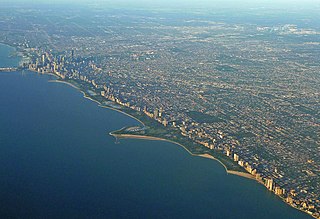
Lincoln Park is a 1,208-acre (489-hectare) park along Lake Michigan on the North Side of Chicago, Illinois. Named after US President Abraham Lincoln, it is the city's largest public park and stretches for seven miles (11 km) from Grand Avenue, on the south, to near Ardmore Avenue on the north, just north of the DuSable Lake Shore Drive terminus at Hollywood Avenue. Two museums and a zoo are located in the oldest part of the park between North Avenue and Diversey Parkway in the eponymous neighborhood. Further to the north, the park is characterized by parkland, beaches, recreational areas, nature reserves, and harbors. To the south, there is a more narrow strip of beaches east of Lake Shore Drive, almost to downtown. With 20 million visitors per year, Lincoln Park is the second-most-visited city park in the United States, behind Manhattan's Central Park.
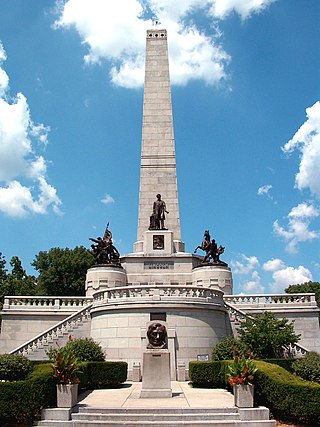
The Lincoln Tomb is the final resting place of Abraham Lincoln, the 16th president of the United States; his wife Mary Todd Lincoln; and three of their four sons: Edward, William, and Thomas. It is located in Oak Ridge Cemetery in Springfield, Illinois.

Rosehill Cemetery is an American garden cemetery on the North Side of Chicago, Illinois, and at 350 acres (1.4 km2), is the largest cemetery in the City of Chicago. According to legend, the name "Rosehill" resulted from a City Clerk's error – the area was previously called "Roe's Hill", named after nearby farmer Hiram Roe. He refused to sell his land to the city until it was promised that the cemetery be named in his honor. It is located in the north east section of the Lincoln Square community area.
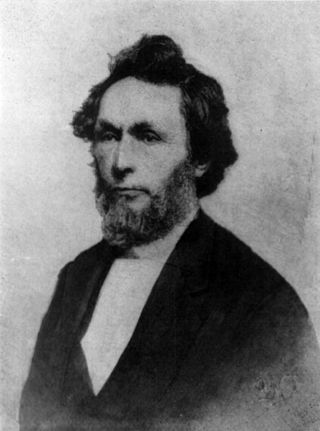
William Henry Herndon was an American lawyer and politician who was a law partner and biographer of President Abraham Lincoln. He was an early member of the new Republican Party and was elected mayor of Springfield, Illinois.

After Abraham Lincoln was assassinated on April 14, 1865, a three-week series of events was held to mourn the death and memorialize the life of the 16th president of the United States. Funeral services, a procession, and a lying in state were first held in Washington, D.C., then a funeral train transported Lincoln's remains 1,654 miles (2,662 km) through seven states for burial in Springfield, Illinois. Never exceeding 20 mph, the train made several stops in principal cities and state capitals for processions, orations, and additional lyings in state. Many Americans viewed the train along the route and participated in associated ceremonies.
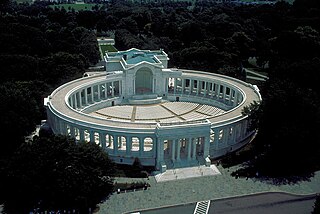
Memorial Amphitheater is an outdoor amphitheater, exhibit hall, and nonsectarian chapel located in Arlington National Cemetery in Arlington County, Virginia, in the United States. It was designed in 1913 as a replacement for the older, wooden amphitheater near Arlington House. Ground was broken for its construction in March 1915 and it was dedicated in May 1920. In the center of its eastern steps is the Tomb of the Unknown Soldier, dedicated in 1921. It has served as the site for numerous Veterans Day and Memorial Day events, as well as for memorial services and funerals for many individuals.

Oak Hill Cemetery is a historic 22-acre (8.9 ha) cemetery located in the Georgetown neighborhood of Washington, D.C., in the United States. It was founded in 1848 and completed in 1853, and is a prime example of a rural cemetery. Many famous politicians, business people, military people, diplomats, and philanthropists are buried at Oak Hill, and the cemetery has a number of Victorian-style memorials and monuments. Oak Hill has two structures which are listed on the National Register of Historic Places: the Oak Hill Cemetery Chapel and the Van Ness Mausoleum.

The Abraham Lincoln National Cemetery is an American military cemetery that covers 982 acres (397 ha) in Elwood, Illinois. It is located approximately 50 miles (80 km) southwest of Chicago, Illinois. When fully completed, it will provide 400,000 burial spaces.
The Illinois Historic Preservation Division, formerly Illinois Historic Preservation Agency, is a governmental agency of the U.S. state of Illinois, and is a division of the Illinois Department of Natural Resources. It is tasked with the duty of maintaining State-owned historic sites, and maximizing their educational and recreational value to visitors or on-line users. In addition, it manages the process for applications within the state for additions to the National Register of Historic Places and other federal preservation schemes.

The Old State Capitol State Historic Site, in Springfield, Illinois, is a former capitol building for the U.S. state of Illinois, and one of two preserved former Illinois capitol buildings. It was built in the Greek Revival style in 1837–1840, when Springfield became the capital city, and served as the state house from 1840 to 1876, when it was replaced by the current capitol. It is the site of candidacy announcements by Abraham Lincoln in 1858 and Barack Obama in 2007. It was designated a National Historic Landmark in 1961, primarily for its association with Lincoln and his political rival Stephen Douglas.

Camp Butler National Cemetery is a United States National Cemetery located a few miles northeast of Springfield and a few miles southwest of Riverton, a small town nearby to Springfield, in Sangamon County, Illinois. It was named for the Illinois State Treasurer at the time of its establishment, William Butler. Administered by the United States Department of Veterans Affairs, it occupies approximately 53 acres (21 ha), and is the site of 19,825 interments as of the end of 2005. Camp Butler National Cemetery was placed on the National Register of Historic Places in 1997.

William Wallace Lincoln was the third son of President Abraham and Mary Todd Lincoln. Willie was named after Mary's brother-in-law, Dr. William Smith Wallace. He died of typhoid fever at the White House, during his father's presidency, age 11.
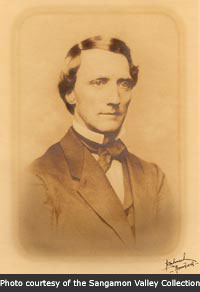
John Whitfield Bunn was an American corporate leader, financier, industrialist, and personal friend of Abraham Lincoln, whose work and leadership involved a broad range of institutions ranging from Midwestern railroads, international finance, and Republican Party politics, to corporate consultation, globally significant manufacturing, and the various American stock exchanges. He was of great historical importance in the commercial, civic, political, and industrial development and growth of the state of Illinois and the American Midwest, during both the nineteenth century and the twentieth century. John Whitfield Bunn was born June 21, 1831, in Hunterdon County, New Jersey. Although every one of the business institutions co-founded or built by the Bunn Brothers has ceased to exist, and fallen purely into the realm of history, each of these businesses left an important legacy of honorable industrial, commercial, and civic vision for Illinois, the Midwest, and the United States.
Captain Patrick D. Tyrrell was an Irish American detective of the United States Secret Service who, as head of the field office in Chicago, became involved in foiling a plot to steal the remains of President Abraham Lincoln on November 7, 1876.
John Carroll Power was an American historian who served as the first custodian of the tomb of Abraham Lincoln, the 16th President of the United States, at Oak Ridge Cemetery in Springfield, Illinois, from its opening in 1874 to his death in 1894.
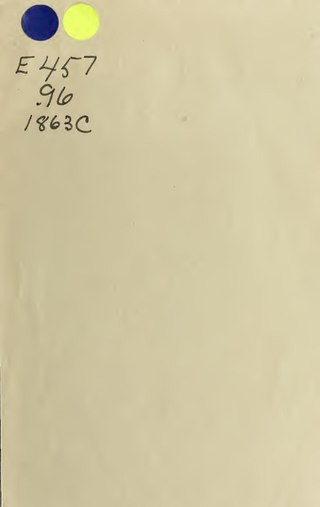
James Cook Conkling was an American politician and attorney from New York City. A graduate of Princeton College, Conkling was admitted to the bar, then moved to Springfield, Illinois. There, he became a prominent Whig, serving first as mayor and later in the Illinois House of Representatives. In 1856, he became one of the first Republicans in the state, attending the Bloomington Convention with Abraham Lincoln. Twice a presidential elector, Conkling was a State Agent during the Civil War and returned to the Illinois House in 1866. Later in his life he was a postmaster and a trustee of the University of Illinois.


























